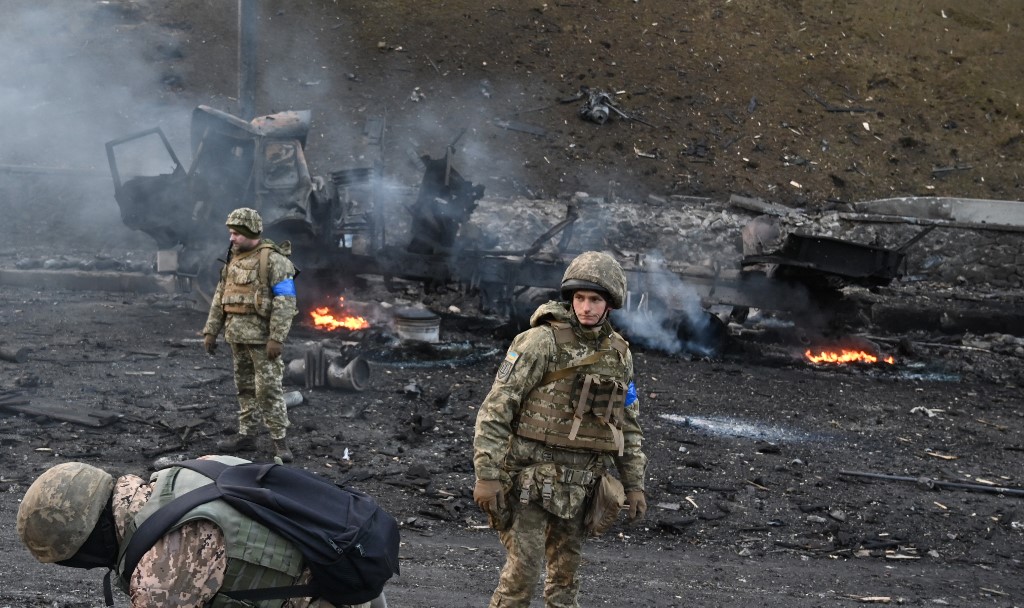
‘A war crime’: two young boys among Ukrainians shot dead during attempted evacuation
Halyna Tovkach, 55, is searching for the body of her husband, Oleg, 62. His death, she says, is part of a war crime in which Russian soldiers also killed two young boys and their mother.
The incident is said to have happened at 7.15 on the morning of 5 March in Bucha, a town north-west of Kyiv, when two families who were neighbours on Ivana Rudenka street tried to escape their hell.
It is, Halyna said, a story she wants the world to hear.
The two families, terrified by the constant shelling and indiscriminate fire that has marked the Russian invasion of Ukraine, had decided to leave Bucha, a town of about 30,000 people, just days earlier.
Food and drink was packed, a route to the western Ukrainian village of Romanivka was planned. They would travel in convoy.
In the front car, a white Ford, were Oleksandr Chykmariov, 42, his wife, Margarita, 33, and their two boys, Matvey, eight and Klim, four.
Behind them, in a white Dodge, were Oleg, his wife, Halyna, who would drive the whole way as her husband did not have a licence, and Tetiana Kovalenko, 50, mother of the wife of their son, Roman, 33.
The two families were nervous but determined. They were destined never to even reach the outskirts of town.
After turning on to Chkalova Street, just 800 metres from their doorstep, a Russian armoured vehicle, unseen by those in the second car, got the convoy in its sights, according to Halyna’s account to the Observer from her hospital bed.
“The Chykmariovs’ car suddenly stopped and so I stopped,” said Halyna. “I saw a door open in the front car and two legs drop out. A thought came to my head, I just thought everybody is killed. It happened so quickly, I don’t know. My husband screamed, ‘turn round, turn round’. Then I felt something hit my right shoulder, a bullet. I pushed my husband to get out of the car. But he wasn’t moving. I realised he was dead. I just opened my door and ran.”
Tetiana, in the back seat, couldn’t get out and had to smash her window open with her feet to escape.
In the front car, which a short while later was consumed by flames, only Oleksandr survived the attack. His wife and two boys had been killed instantly by the machine-gun fire that raked the vehicle.
Oleksandr crawled out of his shattered vehicle taking cover behind Halyna’s car. He reached into the front seat of the Dodge after spotting a mobile phone.
“He called me,” said Roman. “He said, ‘Everyone’s dead. Your mother and father are dead.’”
Oleksandr, who has since lost a leg, was later picked up by passing car. He was not ready to talk about the death of his family when approached by the Observer.
Roman, who had been away on business when Vladimir Putin had begun his war on 24 February, says he will return to Bucha to find his father in a couple of days.
Oleg’s body, locals say, stayed in the car for five days. The Russians would not allow it to be removed. “I don’t know where my father’s body is,” Roman said. “I have to find him.”
His mother is still in hospital after being moved from a local facility to Chernobyl. “The doctors said that one centimetre lower and I would be dead too,” Halyna said. “I saw a V on the armoured vehicle,” she added, referring to the letter that, along with Z, has been painted on Russian vehicles operating in Ukraine.
The understated manner in which Roman and his mother tell their dreadful story belies the strength of their determination that accounts of such crimes will be heard. “I hope this will be of interest to you,” Roman says. “It is a war crime.”
The claims could not be independently verified although the Observer has seen a photograph of Halyna’s wounds and they echo a terrible list of similar stories that have emerged as the Russian troops have been driven back from Kyiv’s suburbs.
On Saturday, the bodies of at least 20 men were found by Ukrainian forces lying in a single street in Bucha. One of them had his hands tied.
Sixteen of the 20 corpses were lying either on the pavement or by the verge, according to an account by AFP journalists who had been given access to the town by the military. Three were sprawled in the middle of the road and another was lying in the courtyard of a house, according to the account.
An open Ukrainian passport lay on the ground next to the person who had his hands tied behind his back with a piece of white cloth. All were said to be wearing civilian clothes – winter coats, jackets or tracksuit tops, jeans or jogging bottoms, and trainers or boots.
Two of them lay near bicycles while another was next to an abandoned car. Some were said to be laid face up, with their limbs unnaturally bent, while others were lying face down. The faces of the dead had taken on a pale waxy appearance, indicating that they may have been there for a number of days.
source: https://www.theguardian.com/world/2022/apr/02/i-realised-my-husband-was-dead-ukrainians-tell-of-russian-army-atrocities
